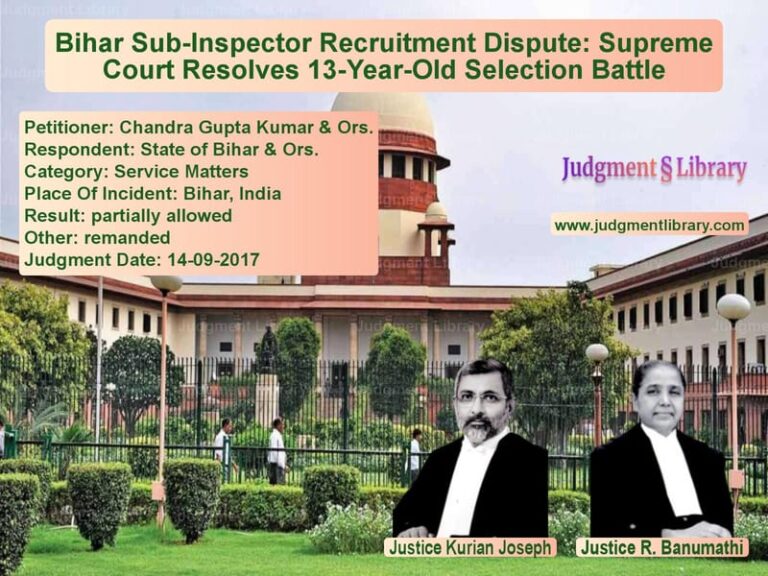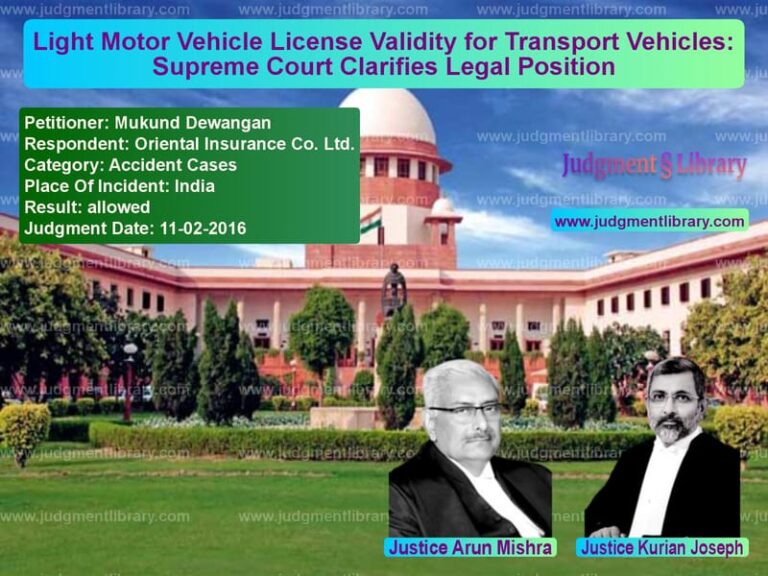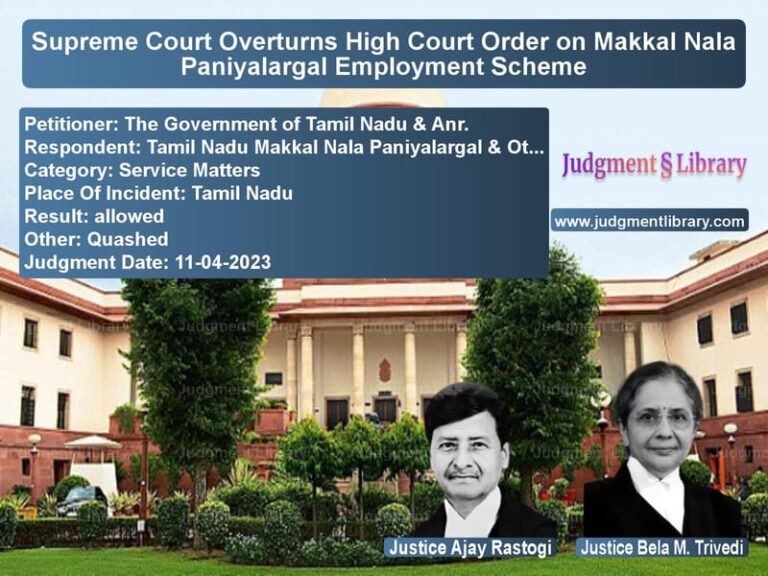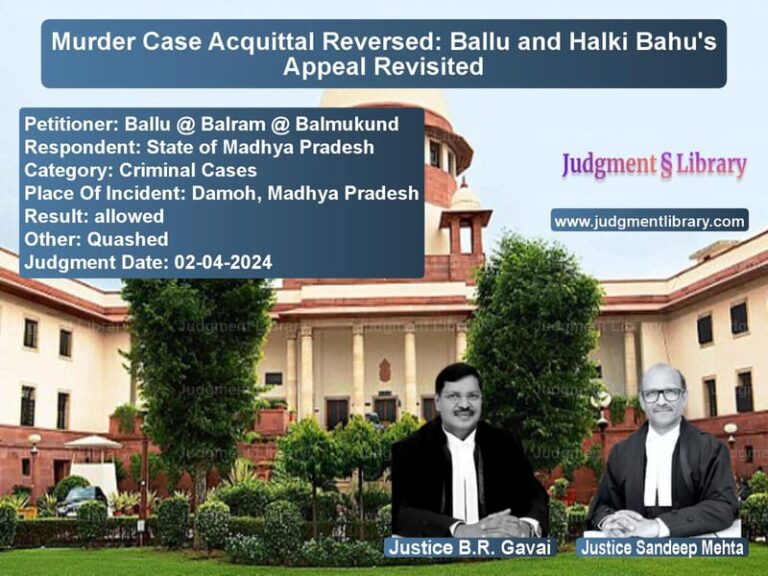Supreme Court Resolves Landlord-Tenant Dispute in Delhi: Detailed Judgment Analysis
The Supreme Court of India recently adjudicated a significant landlord-tenant dispute in the case of Swami Goverdhan Rangachariji & Others versus M/S. A.J. Printers. The dispute revolved around a property located in Sunder Nagar, New Delhi, and was subject to the provisions of the Delhi Rent Control Act, 1995. The landlords sought eviction of the tenant, who had been occupying the property under a lease agreement dating back to October 1, 1972. The legal battle, which had gone through multiple levels of adjudication, culminated in the Supreme Court’s decision that facilitated an amicable resolution between the parties.
Background of the Case
The property in dispute was Bungalow No. 97, Ground Floor, Sunder Nagar, New Delhi. The respondent, M/S. A.J. Printers, had been a tenant in the premises under a written lease agreement. The initial monthly rental was Rs. 2,000, which was later increased to Rs. 3,328. The landlords filed a petition seeking eviction under the Delhi Rent Control Act, 1995, citing specific grounds.
The High Court of Delhi had earlier adjudicated on the matter through its judgment dated August 3, 2021, in CM(M) No. 646/2020. The High Court remanded the case to the Rent Controller for further adjudication. However, the matter reached the Supreme Court, where both parties expressed their willingness to resolve the dispute amicably.
Read also: https://judgmentlibrary.com/supreme-court-resolves-dispute-over-temple-owned-shops-in-tamil-nadu/
Supreme Court’s Consideration and Proceedings
On January 23, 2024, when the matter came up for hearing, the learned counsels for both parties requested time to discuss a potential resolution with their clients. The Court acknowledged the efforts of the counsels and scheduled the next hearing for finalizing an agreement.
On February 23, 2024, the Court was informed that an amicable resolution had been reached, and both parties agreed to the terms laid down during the proceedings. The Supreme Court, taking into consideration the circumstances, including the age and health condition of the tenant, recorded the agreement and disposed of the petition accordingly.
Key Terms of the Agreement
The Supreme Court’s final judgment incorporated the following key terms as agreed upon by both parties:
- Existence of Landlord-Tenant Relationship: The relationship between the petitioners (landlords) and the respondent (tenant) was not in dispute.
- Eviction Order: The tenant consented to an eviction order under the Rent Control Act. Consequently, the Court passed an order in favor of the landlords, directing eviction of the tenant.
- Time to Vacate: Recognizing the age of the tenant (82 years) and his personal hardships, the Court granted him time to vacate the property until February 28, 2025.
- Undertaking by the Tenant: The tenant provided an oral undertaking in court, which was accepted. Additionally, he was required to submit a written affidavit within three weeks confirming the terms of the settlement.
- Consequences of Breach: If the tenant failed to comply with the terms, the landlords would be entitled to initiate contempt proceedings and eviction enforcement.
- Rent Arrears: The tenant was directed to clear any pending rent dues and continue paying Rs. 3,328 per month until the premises were vacated.
- No Damage to Property: The tenant was explicitly prohibited from causing any damage, creating any encumbrances, or transferring possession of the premises.
- Compliance with Municipal Laws: The tenant was required to comply with all municipal by-laws and was forbidden from making unauthorized constructions.
- Clearing Statutory Dues: Before vacating, the tenant had to settle all outstanding statutory dues as per mutually agreed terms.
- Legal Recourse for Violations: If the tenant breached any of the agreed conditions, the landlords were permitted to pursue legal action for possession and initiate contempt proceedings.
- Landlord’s Obligations: The landlords were instructed to allow peaceful enjoyment of the premises until the agreed vacating date.
- Closure of Litigation: All pending legal disputes between the parties concerning the property stood closed.
Legal Implications of the Judgment
The Supreme Court’s judgment in this case highlights several important legal principles concerning landlord-tenant relationships under the Delhi Rent Control Act. Some of the key legal takeaways are:
- The Court reinforced the importance of amicable settlements in landlord-tenant disputes, avoiding prolonged litigation.
- Eviction proceedings under the Rent Control Act require strict adherence to legal procedures, but mutual agreements can simplify the process.
- The ruling underscores that tenants cannot claim indefinite possession without legal basis, particularly when landlords have a valid right to reclaim their property.
- Non-compliance with agreed terms, especially those recorded in court, can result in contempt proceedings.
- Statutory compliance is critical for tenants to avoid legal action, including adherence to municipal by-laws and payment of dues.
Conclusion
The Supreme Court’s intervention in this dispute provided a balanced resolution, ensuring that both parties’ interests were addressed. By granting the tenant time to vacate while securing the landlords’ right to possession, the Court facilitated a fair and legally sound settlement. The ruling reaffirms the judiciary’s commitment to resolving tenancy disputes through a blend of legal enforcement and amicable negotiation.
With this judgment, the longstanding litigation between the parties comes to an end, offering a model framework for similar landlord-tenant disputes in India. The decision reflects a pragmatic approach, prioritizing justice, fairness, and legal compliance.
Petitioner Name: Swami Goverdhan Rangachariji & Others.Respondent Name: M/S. A.J. Printers.Judgment By: Justice J.K. Maheshwari, Justice Sanjay Karol.Place Of Incident: Sunder Nagar, New Delhi.Judgment Date: 23-02-2024.
Don’t miss out on the full details! Download the complete judgment in PDF format below and gain valuable insights instantly!
Download Judgment: swami-goverdhan-rang-vs-ms.-a.j.-printers-supreme-court-of-india-judgment-dated-23-02-2024.pdf
Directly Download Judgment: Directly download this Judgment
See all petitions in Property Disputes
See all petitions in Landlord-Tenant Disputes
See all petitions in Contract Disputes
See all petitions in Damages and Compensation
See all petitions in Judgment by J.K. Maheshwari
See all petitions in Judgment by Sanjay Karol
See all petitions in settled
See all petitions in settled
See all petitions in supreme court of India judgments February 2024
See all petitions in 2024 judgments
See all posts in Civil Cases Category
See all allowed petitions in Civil Cases Category
See all Dismissed petitions in Civil Cases Category
See all partially allowed petitions in Civil Cases Category







